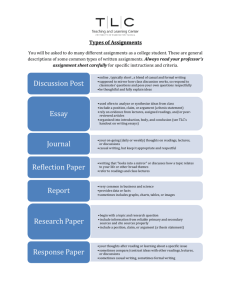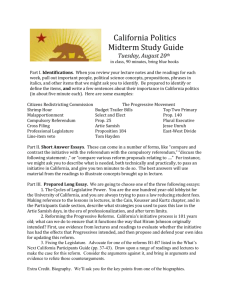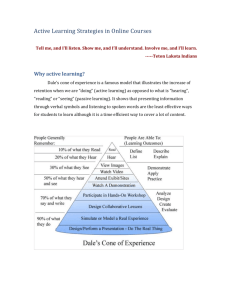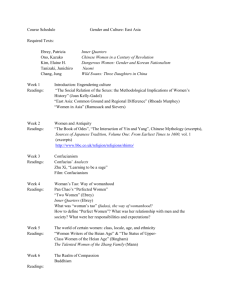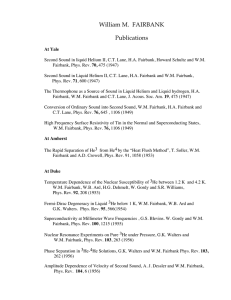HIEA 312 - Cloudfront.net
advertisement
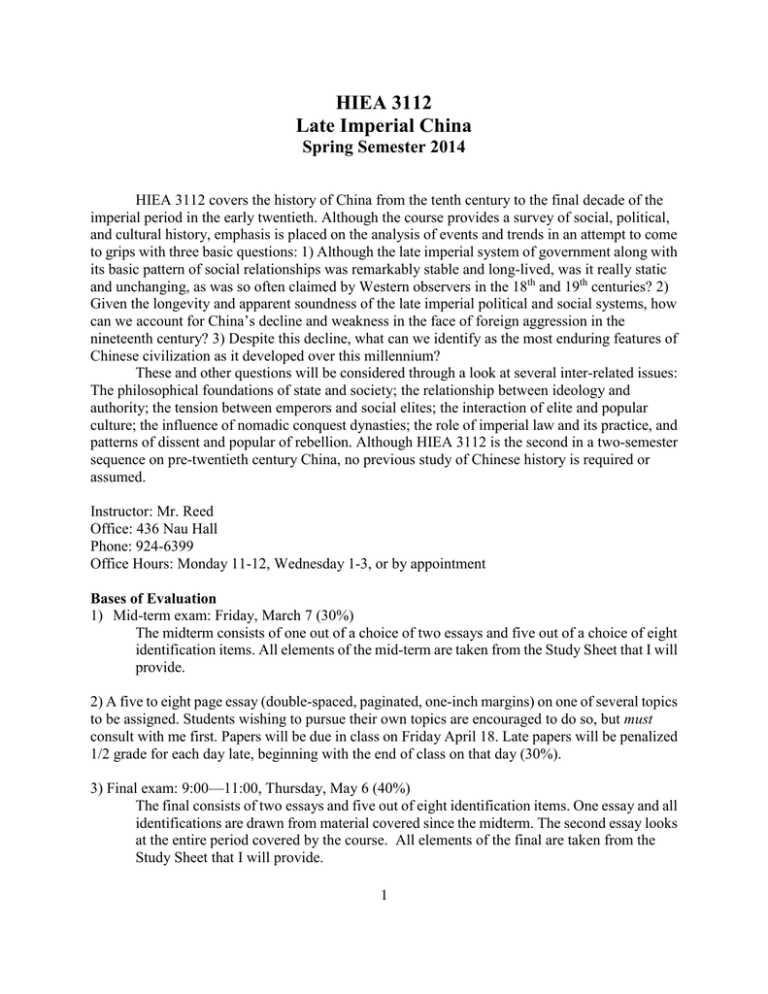
HIEA 3112 Late Imperial China Spring Semester 2014 HIEA 3112 covers the history of China from the tenth century to the final decade of the imperial period in the early twentieth. Although the course provides a survey of social, political, and cultural history, emphasis is placed on the analysis of events and trends in an attempt to come to grips with three basic questions: 1) Although the late imperial system of government along with its basic pattern of social relationships was remarkably stable and long-lived, was it really static and unchanging, as was so often claimed by Western observers in the 18th and 19th centuries? 2) Given the longevity and apparent soundness of the late imperial political and social systems, how can we account for China’s decline and weakness in the face of foreign aggression in the nineteenth century? 3) Despite this decline, what can we identify as the most enduring features of Chinese civilization as it developed over this millennium? These and other questions will be considered through a look at several inter-related issues: The philosophical foundations of state and society; the relationship between ideology and authority; the tension between emperors and social elites; the interaction of elite and popular culture; the influence of nomadic conquest dynasties; the role of imperial law and its practice, and patterns of dissent and popular of rebellion. Although HIEA 3112 is the second in a two-semester sequence on pre-twentieth century China, no previous study of Chinese history is required or assumed. Instructor: Mr. Reed Office: 436 Nau Hall Phone: 924-6399 Office Hours: Monday 11-12, Wednesday 1-3, or by appointment Bases of Evaluation 1) Mid-term exam: Friday, March 7 (30%) The midterm consists of one out of a choice of two essays and five out of a choice of eight identification items. All elements of the mid-term are taken from the Study Sheet that I will provide. 2) A five to eight page essay (double-spaced, paginated, one-inch margins) on one of several topics to be assigned. Students wishing to pursue their own topics are encouraged to do so, but must consult with me first. Papers will be due in class on Friday April 18. Late papers will be penalized 1/2 grade for each day late, beginning with the end of class on that day (30%). 3) Final exam: 9:00—11:00, Thursday, May 6 (40%) The final consists of two essays and five out of eight identification items. One essay and all identifications are drawn from material covered since the midterm. The second essay looks at the entire period covered by the course. All elements of the final are taken from the Study Sheet that I will provide. 1 Texts The following required texts are available in the Bookstore and on Reserve in Clemons Library John K. Fairbank and Merle Goldman, China: A New History Patricia Ebrey, Chinese Civilization: A Sourcebook Jonathan Spence, The Death of Woman Wang Liu Jung-en, (translator), Six Yuan Plays Shen Fu, Six Records of a Floating LIfe Readings marked with an asterisk (*) are contained in a Course Reader available at The Copy Shop on Elliewood Ave. A Note on Honor Code Violations Enrollment in this course is regarded as indication of your agreement to abide by the University’s Honor Code. As a rule, I assume honesty on the part of students and encourage anyone having trouble to come speak with me. If I find evidence of cheating on an exam or paper, however, be assured that I will vigorously pursue the matter, with failure of the class or expulsion from the University as the most likely outcomes. SCHEDULE OF LECTURES AND READINGS Week One (1/13, 15, 17): Introduction and Background Lectures: 1. Course Introduction 2. Geography, language, and variation 3. Cosmic Conceptions and the Human Realm Readings: Fairbank: Introduction, chapter 2 Ebrey: selection 6 Week Two (1/20, 22, 24): Traditions of Thought, Society, and Governance Lectures: 4. Martin Luther King Day, No Class 5. The Imperial State 6. No Class Readings: Fairbank: chapter 3 Ebrey: selections 7, 8, 10, 15 Week Three (1/27, 29, 31): The Song Transformation Lectures: 7. No Class 8. The Song Revolutions 9. Social and Political Transformation 2 (Week Three Continued) Readings: Fairbank: chapter 4 Ebrey: selections 35, 40, 45 *McKnight, The Enlightened Judgments: Introduction Week Four (2/3, 5, 7): The Emergence of Gentry Society Lectures: 10 The Confucian Revival 11. . Kinship, Lineage and Family 12.: The Civil Service Exams and Literati Culture Readings: Ebrey: selections 36, 37, 45, 54, 62 *McKnight: Examinations, Brothers, Husbands and Wives, Filial Piety, Unfiliality, Community, Clerks, Mother and Son Violating the Law and Compounding Evils Week Five (2/10, 12, 14): Northern Conquerors Lectures: 13. Steppe Nomads; Ecosystem, Cultures, and States 14. The Mongol Conquest 15. Mongol Rule in China: the Yuan Dynasty Readings: Fairbank: chapter 5 F. W. Mote: “China under Mongol Rule” (Collab) Week Six (2/17, 19, 21): The Yuan Dynasty Lectures: 16. Elite Responses to “Barbarian Rule” 17. Peasant Life and Urban Scenes 18. Discussion: Drama and Dissent in the Yuan Readings: Ebrey: selections 46, 39 Six Yuan Plays: "The Orphan of Chao," "The Injustice Done to Tou Ngo," “The Soul of Ch’ien-nü Leaves Her Body” Week Seven (2/24, 26, 28): The Ming Dynasty: Rise of the Autocratic State Lectures: 19. Smugglers, Bandits, and Rebels: the Founding of the Ming 20. Early Ming Autocracy 21. Elements of Imperial Control Readings: Fairbank: chapter 6 3 Week Eight (3/3, 5, 7): Ming Society Lectures: 22. Popular Culture: Romantic Love and the Individual in Ming Fiction 23. Discussion: Ideology and Society under the Ming 24. Midterm Exam Readings: *Ma and Lau (trans): "The Pearl Shirt Re-encountered" *Li Yu: The Carnal Prayer Mat, chapters 1 and 2 Week Nine (3/10, 12, 14): Spring Break Week Ten (3/17, 19, 21): The Manchu Conquest Lectures: 25. The Rise of the Manchus 26. Conquest and Consolidation 27. The Imperial Order in the High Qing Readings: Fairbank: chapters 7 and 8 Ebrey: selections 59, 61, 64 *Huang Liu-hung, A Complete Book Concerning Happiness and Benevolence, Translator’s introduction Week Eleven (3/24, 26, 28): Late Imperial Law and Society Lectures: 28. Law and Justice 29. Judicial Theory versus Practice 30. Discussion: The Role of Law in Society Readings: Jonathan Spence: The Death of Woman Wang *Huang Liu-hung: "Administration of Justice," (chuan 11 and 12) *Wallace Johnson: The Tang Code, chapters 1 and 2 Week Twelve (3/31, 4/2, 4): Internal Pressures and External Crises Lectures: 31. Early Western Contact & Trade: The Canton System 32. The Price of Success: Population and Economy 33. First-stage Imperialism: The Opium War and the Opening of China Readings: Fairbank: chapter 9 Ebrey: selection 68 *Teng and Fairbank, China's Response to the West, pages 23-28, 36 4 Week Thirteen (4/7, 9, 11): Voices of Dissent: Women and Elites Lectures: 34. Elites, Exams, and Status in the Late Qing 35. Gilded Cages and Bound Feet, Women in Late Imperial Society 36. Discussion: Status and Livelihood in the Qing Readings: Ebrey: selections 17, 38, 55, 56 *Wu Jingzi: The Scholars, chapters 1-3 Shen Fu: Six Records of a Floating Life Week Fourteen (4/14, 16, 18): Voices of Dissent: Peasant Rebels Lectures: 37. Patterns of Peasant Protest 38. Mid-century Rebellions 39. The Self-strengthening Movement (Papers Due in Class) Readings: Fairbank: chapters 10 and 11 Ebrey: selections 69, 70 *William T. deBary: Sources of Chinese Tradition, v. II, pages 43-51, 59-87 Week Fifteen (4/21, 23, 25): Twilight of the Imperial Order Lectures: 40. Second- stage Imperialism: Carving the Chinese Melon 41. The Final Decade: From Reform to Revolution 42. The 1911 Revolution: The Emperor Dethroned Readings: Fairbank: chapter 12 Ebrey: selections 73, 75, 76 Week Sixteen (4/28): Summing Up 43. Gazing Back, Looking Forward Final examination, Tuesday, May 6, 9:00—11:00 5

